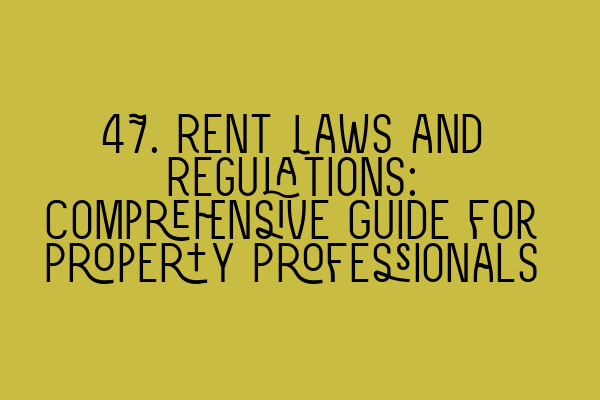47. Rent Laws and Regulations: Comprehensive Guide for Property Professionals
Welcome to SQE Property Law & Land Law’s blog, where we provide you with comprehensive guides and insights to help you navigate through the complex world of property law. In this article, we will delve into the intricacies of rent laws and regulations, equipping property professionals like you with the knowledge needed to ensure compliance and successful management of rental properties.
Understanding Rent Laws and Regulations
Rent laws and regulations are a critical component of property management. They govern the relationship between landlords and tenants, outlining the rights and responsibilities of each party. Compliance with these laws is essential to maintain a fair and lawful rental environment.
As a property professional, it is crucial to understand the key aspects of rent laws and regulations to provide accurate advice and guidance to landlords and tenants. Let’s explore some essential topics:
1. Types of Tenancies
There are various types of tenancies, each governed by specific laws and regulations. Some common types include:
2. Rent Increase
Landlords must follow specific rules when increasing rent. These rules depend on the type of tenancy and the terms laid out in the tenancy agreement. Understanding the legal requirements surrounding rent increase is vital to ensure compliance and avoid disputes.
3. Rent Arrears and Eviction
In cases of rent arrears or other breaches of the tenancy agreement, landlords have the right to evict tenants. However, strict procedures must be followed to safeguard the rights of both parties. Familiarize yourself with the legal process of eviction to protect your clients’ interests.
4. Tenancy Deposit Protection
Tenancy deposit protection schemes aim to safeguard tenants’ deposits and resolve disputes over their return. As a property professional, you must ensure that landlords comply with their legal obligations regarding deposit protection, including registration with an approved scheme.
Staying Up to Date with Rent Laws and Regulations
Rent laws and regulations are not static; they evolve over time. It is crucial for property professionals to stay up to date with the latest changes and updates in order to provide accurate advice and keep their clients informed. Here are some ways you can stay informed:
- Regularly review government websites related to property law.
- Attend legal seminars and workshops dedicated to rent laws and regulations.
- Engage with professional networks and organizations that focus on property law.
- Subscribe to reliable legal publications and newsletters.
By staying informed and continually updating your knowledge, you can ensure that you are providing your clients with the most accurate and up-to-date advice possible.
Conclusion
Rent laws and regulations are a vital aspect of property management. As a property professional, it is crucial to have a comprehensive understanding of these laws to ensure compliance and provide accurate advice to clients. By staying informed and keeping up with the latest changes in rent laws and regulations, you can confidently navigate the complexities of the rental market and provide exceptional service to your clients.
If you’re looking to enhance your knowledge and prepare for the SQE exams, check out our related articles:
